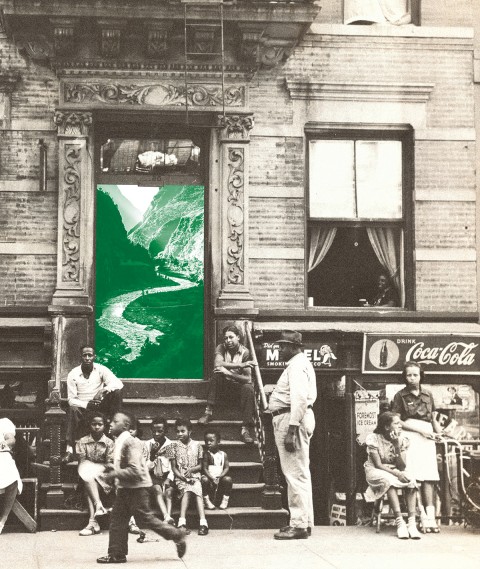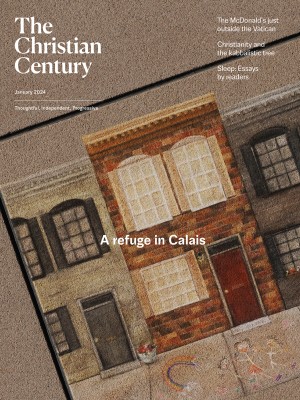Nature is not an escape
To understand this, I had to stop reading John Muir and turn to the nature writing of the Harlem Renaissance.

(Century illustration / Image sources: New York Public Library and Unsplash)
While crossing the Mississippi River by train as a teenager, Langston Hughes wrote a poem about the longest and most powerful rivers in the world as sources of Black dignity and intimacy. Hughes wrote “The Negro Speaks of Rivers” in 1920, a year after the brutal violence of the Red Summer, when White mobs tortured and lynched masses of Black people across the United States. Reading this poem, I cannot forget that these horrors enacted upon Black people often took place by riverbanks. The secluded wilderness was a place where White people were free to kill with impunity.
Encounters with Hughes and other writers have led me to interrogate the place of the sublime in my theology of nature. I absorbed a perspective indebted to naturalists like John Muir, who saw in the pristine splendor of the frontier a chance to escape the chaos and grime of city life. I was drawn to the outdoors as a site of awe and inspiration, and I recognized the threat to these wonders caused by development and human intrusion.
Read our latest issue or browse back issues.
But I also imbibed what Paul Outka calls an “extrahistorical real.” The literary scholar argues that going west to the wilderness allowed Muir to disengage from the “trauma of the war, the horrors of slavery, the sharp division between north and south” during the Civil War. Muir ignored the fact that his natural wonders bore the scars of the forced removal and genocide of Indigenous people. In the words of Black poet and nature writer Camille Dungy, “I have never believed John Muir had any interest in me.”
As wildfires tear across Maui and the Canadian wilderness, as 100-year storms visit us yearly, as catastrophic flooding wipes away vulnerable coastal communities, I’ve returned to the nature writings of the Harlem Renaissance and to womanist conceptions of ecology in order to better read the Bible and to find a home for my grief and my hope for our planet’s future. I’ve needed these laments, which trace the complex terrors of greed and race, to ground myself in a world that is coming apart.
The nature writing of the Harlem Renaissance holds together the dualities of environmental terror and homecoming. I thought of this paradox as I stood on the deck of a boat, floating past the levees on the Mississippi. Marvels of engineering, these levees muscle back the waters of the powerful river, providing tenuous and fragile land for human habitation. Throughout the 20th century, the unnatural restraint of levees allowed White business owners to prosper at the expense of Black workers on their farms and in their factories.
This marriage of capital and environmental possession erupted in 1927 when the Mississippi flooded the Yazoo Delta, killing hundreds of people and displacing 640,000 workers—most of them Black—who lived their lives on the riverbank. “When it thunders and lightnin’, and the wind begins to blow,” wailed Bessie Smith that year in “Backwater Blues,” “There’s thousands of people, ain’t got no place to go.” It was the greatest natural disaster in recorded US history.
I can remember feeling a chill of despair reading “Down by the Riverside,” Richard Wright’s short story of desperation and trauma that unfolds during the Great Mississippi Flood. Mann, a Black worker and father, is desperate to obtain a boat to rescue his family from the floodwaters that are consuming the house around them. When soldiers force him at gunpoint to help reinforce the dangerously bulging levees, he sees a snaking line of Black men loading boats with sandbags from a nearby cement plant. “In front of him,” Wright writes, “he could feel the river as though it were a live, cold hand touching his face.” Then a siren blares. The levee breaks. “The long lines of men merged into one whirling black mass. Shouts rose in a mighty roar.” The river of Black men is the river of the Mississippi, a common fate and a common destruction. Nature’s force overwhelms the technologies of the wealthy and destroys the vulnerable in the process.
In an essay about her complex relationship to the outdoors as a Black woman, Evelyn White describes the dueling emotions that accompanied her desire to live in the Northern California woods: “Elation at the prospect of living closer to nature and a sense of absolute doom about what might befall me in the backwoods.” Among trees and along rivers she shares a genetic memory with her ancestors—“exposed, vulnerable, and unprotected.” It takes time, but White comes to discover that within the trauma of the past are the rivers which also watered her ancestors. She takes a rafting trip and notices “stately rocks, soaring birds, towering trees.” She welcomes rapids like “a runaway roller coaster.” She can hear the voice of Hughes in the sky: “I’ve known rivers ancient as the world and older than the flow of human blood in human veins.”
The words of these writers are at home with what I know of the natural world from the writers of the Old Testament, people who also experienced creation as both power and terror, hope and deliverance, intertwined with politics and dominion. In Exodus, Egypt is the archetype slaver, a possessor of creatures both human and nonhuman. Egyptian treatment of the enslaved Hebrews echoes back in the nation’s treatment of the Nile, the source of Egyptian state power. In Ezekiel we learn the extent of the unnamed Pharaoh’s hubris when he announces that he is the Nile’s creator. “My Nile is my own, I made it for myself,” Pharaoh boasts. “Who owns a river? Who claims the waters as their own handiwork?” Ezekiel blasts in return.
I sense God’s presence in our natural world when I read a description of the Nile as a churning omen of death to the haughty Egyptians. In the scriptures rivers praise and flee. They are both a source of delight and a threat of destruction. Black writers join the Bible in pointing us to nature’s power not as an escape to the sublime, removing us from the hardness of concrete and pavement, but as a site of human terror and a source of life.






